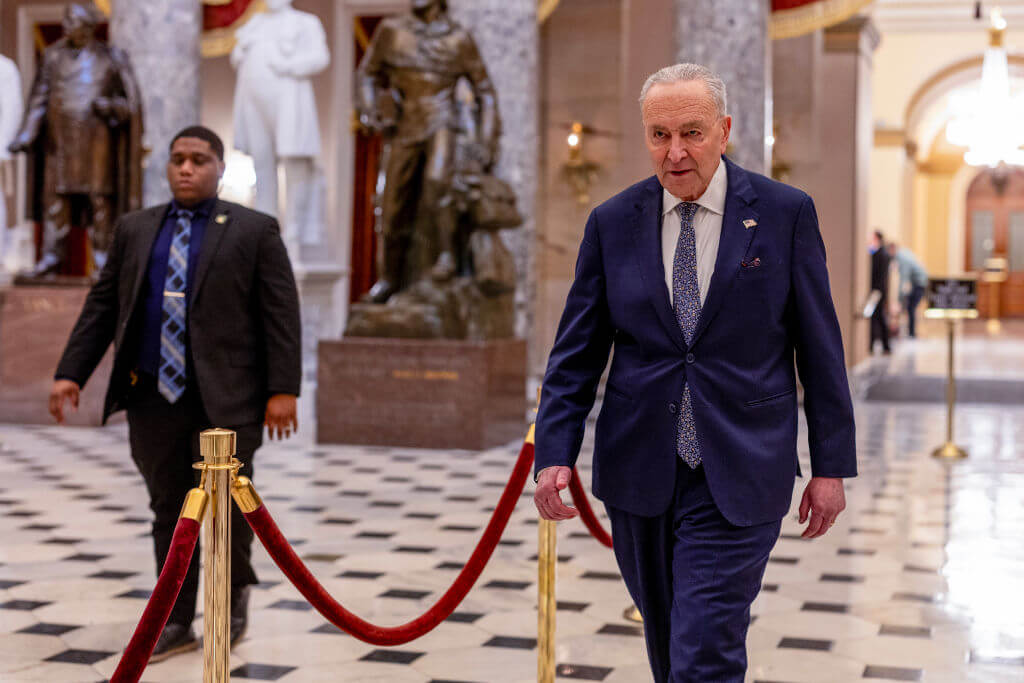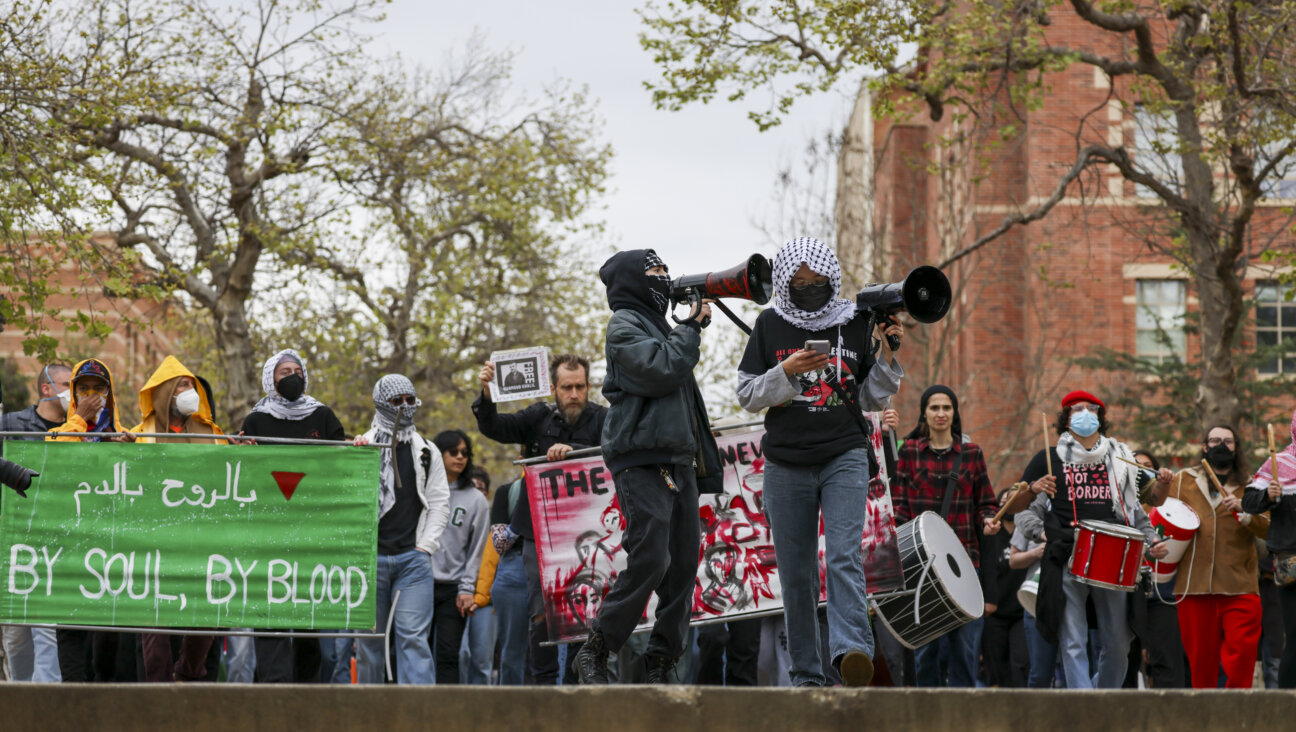HIAS was poised to spend $300k on Gaza aid. Internal divisions stopped it
‘It’s not easy being a Jewish humanitarian organization at this point in history,’ said Mark Hetfield, the chief executive of HIAS

A driver aboard a truck carrying humanitarian aid after crossing from Egypt to the Gaza Strip in October. HIAS, a Jewish organization serving refugees, has faced internal divisions over how to respond to the Israel-Hamas war. Photo by Getty Images
Shortly after the Oct. 7 attack, Mark Hetfield, the chief executive of HIAS, sent a message to the organization’s supporters: “HIAS is here to help.”
He said that HIAS, which was founded to assist Jewish refugees but has expanded to become a broad humanitarian aid organization, would serve those most impacted by the conflict.
“Even as we grieve, HIAS will continue to live our values, including our commitment to the belief that all people have the right to live in safety, dignity, and peace,” he wrote, “both within Israel’s internationally recognized borders, as well as the Occupied Palestinian Territory.”
HIAS raised $2.3 million for its emergency response, according to an internal company presentation, and assigned 15 employees to its Israel office to help Jews, Arabs and African asylum seekers impacted by the Hamas attack. But as the subsequent war expanded, and the death toll mounted in Gaza, divisions emerged within HIAS over how much the group would do on behalf of Palestinians there.
As at many organizations, there was tension between staff and board of directors over whether to call for a ceasefire, and more than 425 employees recently signed two open letters calling for more decisive action. Employees were told several months ago that HIAS had earmarked $300,000 of the emergency fund for Gaza, but the group has yet to distribute any of that money.
Interviews with six current and former employees, and a recording of an internal meeting obtained by the Forward, suggest that is because the organization fears offending Jewish donors, including board members, though there are also technical obstacles related to its accreditation. And the debates have unfolded as the organization grappled with financial errors that led to layoffs last month of 43 employees — roughly 12% of its workforce.
“Mark is really pro-responding-in-Gaza but has had to be very careful with how he deals with the board,” said one former employee.
The current and former HIAS work interviewed for this article spoke on the condition they not be named. Some signed non-disclosure agreements when they were laid off in April. Others were concerned that speaking critically about their employer in public could damage their careers.
[Have a tip? Contact reporter Arno Rosenfeld at [email protected] or message on Signal at 202-677-5462]
Hetfield, an immigration lawyer who has run HIAS since 2013, downplayed the differences between the board and staff over the organization’s role in Gaza.
“It’s not an ‘us and them,’” he said in an interview. “We have to come together and figure this out and we’re working really hard at that but we’re not quite there yet.”
He added: “It’s not easy being a Jewish humanitarian organization at this point in history.”
Money for Gaza
Jewish organizations have raised $1.4 billion for emergency aid to Israel since Oct. 7. Almost all of that money has gone to support for Jewish victims and some other residents of Israel. The New Israel Fund became the first major Jewish group to publicly raise money directly for humanitarian relief in Gaza when it launched a campaign last month that has raised $750,000.
But one HIAS worker who was laid off last month said the group’s fundraising team was told in the immediate aftermath of Oct. 7 that they should tell prospective donors a share of their contributions would go to help Palestinians.
“Sometimes we would say half,” this employee said.
Asked about this, the organization’s head of fundraising, Beth Oppenheim, said it was untrue: “HIAS did not tell this to prospective donors.”
At a March meeting, a Zoom recording of which was shared with the Forward by a former employee, Raphael Marcus, HIAS’s program director, and James Orlando, head of the emergency response team, told the program staff that $300,000 of the money raised — about 13% — was supposed to go to Gaza but that it was stuck in limbo.
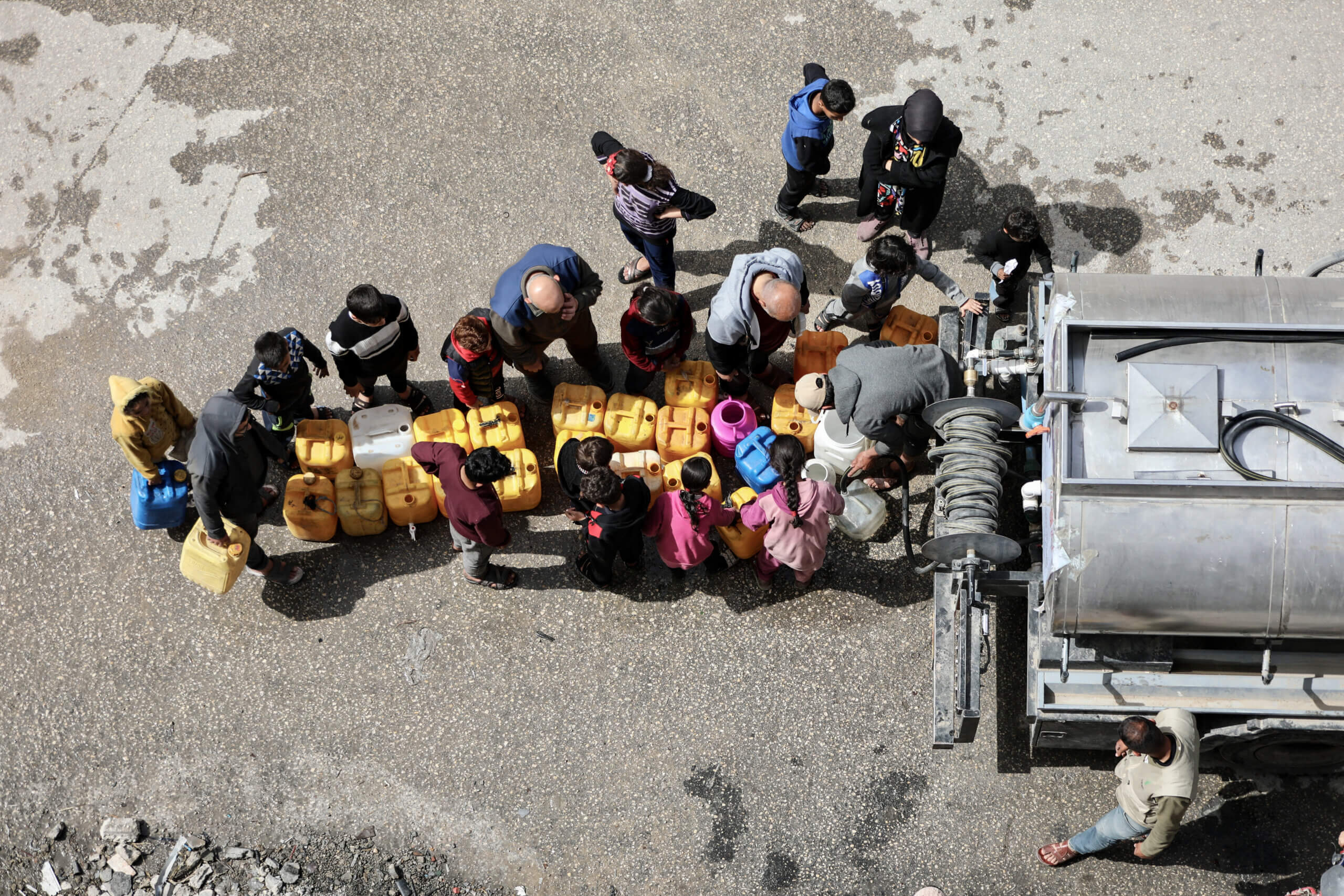
Employees say they were told the board had final authority on major spending decisions and had not issued a decision about Gaza aid.
“We have these funds, we need a go ahead,” said a current employee. “Even though they haven’t said an outright ‘no’ they also have said nothing and it’s like — we’re almost at the end of May.”
Hetfield disputed that characterization. “The board and staff are aligned” on the idea that HIAS should be more involved “in the humanitarian response in Gaza,” he said. “But we haven’t yet settled on what that response should be.”
Jeff Blattner, chair of the HIAS board and its executive committee, declined an interview request but said in a text message that there are “ongoing productive efforts between the board and staff to work through complex questions.”
These questions include how to deliver the aid — and whether the group is even allowed to do so. NIF funneled aid through World Central Kitchen and International Rescue Committee, which are operating on the ground inside the enclave, and HIAS employees said they were told the group planned to do something similar with the $300,000. But Hetfield said even that kind of partnership is fraught.
When HIAS became a United Nations-accredited organization in 2008, the agreement stated that the group would not be involved with “settlement activity or any other activity” in the occupied West Bank and Gaza.
Hetfield said that provision was meant to safeguard Palestinian human rights, but that a strict interpretation could also prohibit HIAS from funding humanitarian work in Gaza. “We can debate that,” he said. “And we are debating it.”
Caution over ‘ceasefire’ call
The Hebrew Immigrant Aid Society was created in 1903 to help Jews arriving in the U.S. after fleeing antisemitic violence in Eastern Europe. It officially changed its name to HIAS in 1975, and for the past quarter century has worked almost entirely with refugees who are not Jewish.
Today, the group operates in more than 20 countries across four continents.
But HIAS retains its identity as a Jewish organization. The vast majority of its 25-member board is Jewish, along with many of its donors. That has informed its response to Oct. 7 and the war in Gaza.
More than 400 employees around the world, nearly a third of its workforce, signed a letter this month criticizing that response and calling for more clarity on what, if anything, HIAS would do in Gaza. Some members of the Israeli staff, which had about 15 employees before the war, wrote a similar letter. Employees described the contents of the worldwide staff letter but would not share it.
Raphael Marcus, the chief programs officer at HIAS, explains why the organization has not called for a ceasefire in the Israel-Hamas war during a March town hall meeting with members of his team.
At the March staff meeting, Marcus, the program director, said he had gotten a lot of questions from employees who were unhappy about the fact that HIAS was nearly alone among major international humanitarian aid organizations in not having called for a ceasefire.
“The ceasefire question is a question between HIAS leadership and the board and that is really where the issue is,” Marcus said, according to the video recording obtained by the Forward. “A ceasefire is something we never did because that was something the board doesn’t want us to do.”
Many HIAS board members are liberal Jews who have supported the organization’s work fighting the Israeli government over its treatment of asylum seekers. But calls for a ceasefire in Gaza have been a third rail at Jewish organizations, including those that are otherwise progressive.
One board member, Steven Koltai, a telecommunications entrepreneur, has published criticism of the Israeli government along with empathy for its war effort and a desire to find “silver linings” in the conflict on his Substack blog.
“What would Americans — including college students — say if the tables were turned?” wrote Koltai, who volunteered in Israel during the Yom Kippur War in 1973. “What would we think if, for example, those celebrating life in a Coachella music festival were invaded by marauders from across the border?”
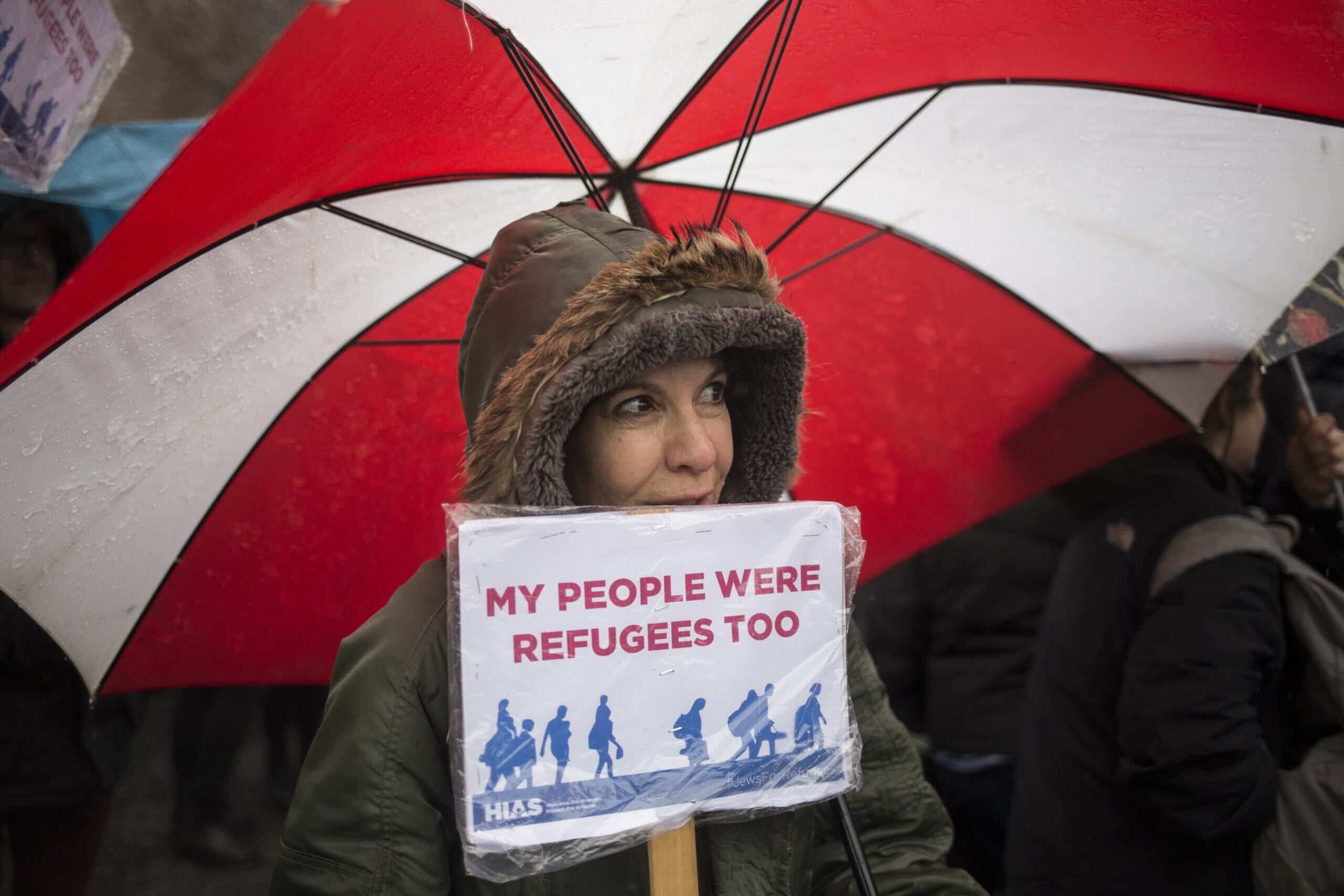
In an interview, Hetfield said it would require a board decision for the organization to use the term “ceasefire,” which he called “a trigger word in our community.” He demurred when asked whether he would call for a ceasefire if the board allowed it, saying, “What I want is not relevant here.”
“We are focused on calling for stopping civilian deaths, stopping deaths of journalists, stopping deaths of humanitarian workers, ending the famine,” he said. “It’s not effective for us to say things that will unnecessarily alienate the people that support us.”
Back in October, HIAS twice called for a “swift de-escalation” of the conflict, and in November, the group released a statement that read in part: “We grieve for the enormity of the suffering in Gaza. We mourn the deaths as a loss no less tragic than the deaths of Israelis.”
HIAS began warning of a Gaza famine in January, and after the March staff meeting, released another statement saying, “Starvation has already begun to claim its first victims” and that the level of aid flowing to Gaza was a “trickle” that “borders on performative.”
But the statements did not directly blame Israel for the aid shortages, directing its calls to “governments and the international community.”
Asked who was at fault, Hetflied said: “It’s the international community, it’s Israel, it’s Egypt, and all of us can play a stronger role.”
‘HIAS is a Zionist organization’
Some employees also balked at statements about the war being put out by the staunchly pro-Israel Conference of Presidents of Major American Jewish Organizations, which HIAS has been a part of for decades. They were especially alarmed when that group praised the Biden administration for suspending funding to UNRWA, the United Nations agency that helps Palestinian refugees, after Israel accused 12 of the agency’s 13,000 employees of participating in the Oct. 7 attacks.
The coalition’s statement said that “10% of UNRWA personnel in Gaza are terrorists.”
Marcus, the HIAS program director, said at the March staff meeting that HIAS did not review that statement before it was released and that Hetfield wrote a letter to the conference’s leadership objecting to it. “We have pushed back very hard on that,” he said.
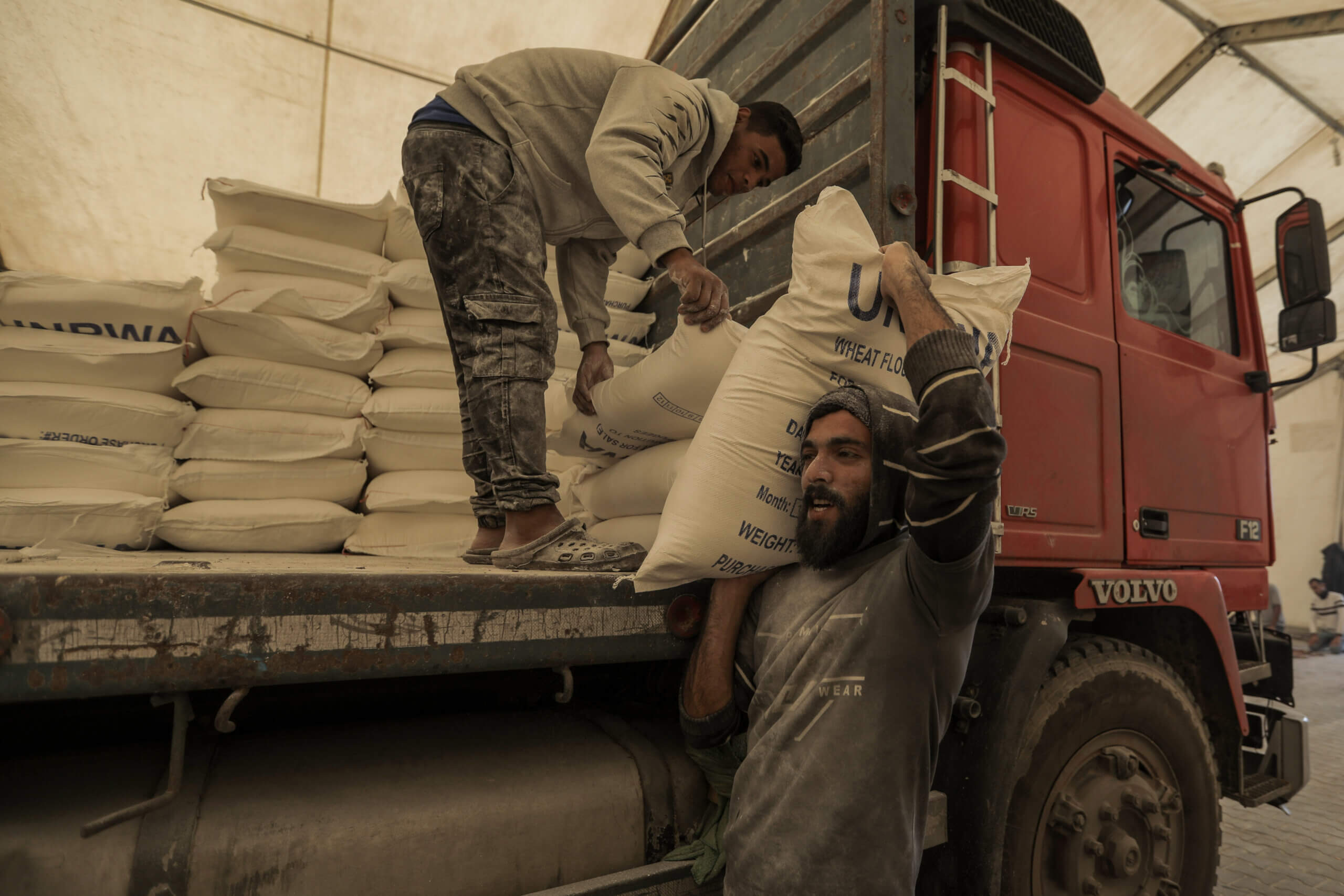
Asked about this, the head of the Conference of Presidents, William Daroff, said in an emailed statement that “our view that UNRWA does more harm than good represents the view of the overwhelming vast majority of our member organizations.” Daroff said he had reiterated to President Joe Biden just this week the importance of suspending the agency’s funding.
Blattner, the HIAS board chair, liked a post on X (formerly Twitter) this month that stated: “UNRWA is Hamas. Hamas is UNRWA.”
Marcus, who previously worked for several Israeli humanitarian organizations, said that he had also received feedback from employees expressing “some dismay about the Zionist agenda of the Conference of Presidents and us being part of that.”
“I just have to clarify, HIAS is a Zionist organization,” he told several dozen employees gathered on Zoom and in a conference room at the organization’s headquarters outside Washington, D.C., for the town hall meeting. “We do believe in the right of Israel to exist as the homeland of the Jewish people, so there is no problem with us being part of that.”
Hetfield, though, in our interview, described “Zionist” as another “trigger word” that HIAS seeks to avoid. He noted that the organization has worked in Israel since its founding, and that the country’s existence had effectively solved the issue of Jewish refugees, since Israel offers citizenship to almost all Jews. That, he noted, had allowed HIAS to expand its work to focus on other refugee populations.
“It’s made our jobs and the lives of the people we were founded to help so much better,” Hetfield said. “If we were only in two countries, those two would likely be the U.S. and Israel.”








